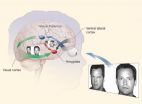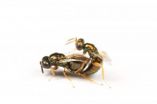(Press-News.org) A new owl is the first endemic bird species discovered on the island of Lombok, Indonesia, according to research published February 13 in the open access journal PLOS ONE by an international team headed by George Sangster of the Swedish Museum of Natural History and colleagues from other institutions.
The new species has long been confused with a more widespread Indonesian owl species because of its similar plumage. However, in September 2003, two members of the team independently discovered that the vocalizations of the owls on Lombok were unique and different from all other Indonesian owls.
George Sangster comments, "It was quite a coincidence that two of us identified this new bird species on different parts of the same island, within a few days of being on the island. That is quite a coincidence, especially considering that no-one had noticed anything special about these owls in the previous 100 years."
Because owls are mostly nocturnal, they use songs to communicate and recognize their own species. Thus, when owls have consistently different vocalizations this is generally taken to mean that they are different species. The new owl's song is a whistled note completely unlike that of other owls. Locals on the island recognize the bird and refer to it as "burung pok", an onomatopoeic name reflecting the song note of the bird, which sounds like "pok" or "poook", say the authors.
Based on their field work, comparisons to museum specimens and previous studies, the researchers suggest that the new owl species is unique to this one island. When surveyed, locals on the neighboring island of Sumbawa were unfamiliar with the bird. The researchers say, "With one exception, none of the locals recognized the songs from playback of recordings made on Lombok except for one man, but he was an immigrant from Lombok who knew the song only from Lombok and had never heard it on Sumbawa."
The new species of owl is named Otus jolandae, after the wife of one of the researchers who co-discovered the species in 2003. The authors suggest using the common name Rinjani Scops Owl, after Gunung Rinjani, a volcano on Lombok that is the second highest volcano in Indonesia.
###
Citation: Sangster G, King BF, Verbelen P, Trainor CR (2013) A New Owl Species of the Genus Otus (Aves: Strigidae) from Lombok, Indonesia. PLoS ONE 8(2): e53712. doi:10.1371/journal.pone.0053712
Financial Disclosure: This study was funded by the authors.
Competing Interest Statement: The authors have declared that no competing interests exist.
PLEASE LINK TO THE SCIENTIFIC ARTICLE IN ONLINE VERSIONS OF YOUR REPORT (URL goes live after the embargo ends): http://dx.plos.org/10.1371/journal.pone.0053712
New owl species discovered in Indonesia is unique to one island
New owl is first endemic bird species discovered on the island of Lombok
2013-02-14
ELSE PRESS RELEASES FROM THIS DATE:
The party in your brain
2013-02-14
A team of political scientists and neuroscientists has shown that liberals and conservatives use different parts of the brain when they make risky decisions, and these regions can be used to predict which political party a person prefers. The new study suggests that while genetics or parental influence may play a significant role, being a Republican or Democrat changes how the brain functions.
Dr. Darren Schreiber, a researcher in neuropolitics at the University of Exeter, has been working in collaboration with colleagues at the University of California, San Diego on ...
Threat bias interacts with combat, gene to boost PTSD risk
2013-02-14
Soldiers preoccupied with threat at the time of enlistment or with avoiding it just before deployment were more likely to develop post-traumatic stress disorder (PTSD), in a study of Israeli infantrymen. Such pre-deployment threat vigilance and avoidance, interacting with combat experience and an emotion-related gene, accounted for more than a third of PTSD symptoms that emerged later, say National Institutes of Health scientists, who conducted the study in collaboration with American and Israeli colleagues.
"Since biased attention predicted future risk for PTSD, computerized ...
CU-Boulder amphibian study shows how biodiversity can protect against disease
2013-02-14
The richer the assortment of amphibian species living in a pond, the more protection that community of frogs, toads and salamanders has against a parasitic infection that can cause severe deformities, including the growth of extra legs, according to a new study by the University of Colorado Boulder.
The findings, published Feb. 14 in the journal Nature, support the idea that greater biodiversity in larger-scale ecosystems, such as forests or grasslands, may also provide greater protection against diseases, including those that attack humans. For example, a larger number ...
Sustainable new catalysts fueled by a single proton
2013-02-14
CHESTNUT HILL, MA (Feb. 14, 2013) – Chemists at Boston College have designed a new class of catalysts triggered by the charge of a single proton, the team reports in the most recent edition of the journal Nature. The simple organic molecules offer a sustainable and highly efficient platform for chemical reactions that produce sets of molecules crucial to advances in medicine and the life sciences.
Unearthing a reliable, truly general, efficient synthesis of single mirror-image isomers has proven elusive. Previous methods suffer from a combination of extreme temperatures, ...
'Significant' proportion of HIV positive patients may not be telling NHS staff about their infection
2013-02-14
A significant proportion of HIV positive patients may not be disclosing their infection to NHS staff, when turning up for treatment at sexual health clinics, suggests preliminary research published online in the journal Sexually Transmitted Infections.
If the findings reflect a national trend, this could have implications for the true prevalence of undiagnosed HIV infection in the population, which is based on the numbers of "undiagnosed" patients at sexual health clinics, say the authors.
Currently, it is estimated that around one in four people in the UK who is HIV ...
California's Tobacco Control Program generates huge health care savings, UCSF study shows
2013-02-14
Over a span of nearly 20 years, California's tobacco control program cost $2.4 billion and reduced health care costs by $134 billion, according to a new study by UC San Francisco.
Additionally, the study -- covering the beginning of the program in 1989 to 2008 -- found that the state program helped lead to some 6.8 billion fewer packs of cigarettes being sold that would have been worth $28.5 billion in sales to cigarette companies.
The study was designed to calculate the fiscal impact of California's large public health program on smoking prevalence and cigarette consumption. ...
Cracking the semantic code
2013-02-14
We make choices about pretty much everything, all the time – "Should I go for a walk or grab a coffee?"; "Shall I look at who just came in or continue to watch TV?" – and to do so we need something common as a basis to make the choice.
Dr John Fennell and Dr Roland Baddeley of Bristol's School of Experimental Psychology followed a hunch that the common quantity, often referred to simply as reward, was a representation of what could be gained, together with how risky and uncertain it is. They proposed that these dimensions would be a unique feature of all objects and ...
Finding 'Mr. Right,' how insects sniff out the perfect mate
2013-02-14
TEMPE, Ariz. – You may want to ramp up your romance this year by sharing a candlelight dinner, a walk on the beach, or even the scent of a perfume, but will that help you find your perfect mate? For one wasp species, it only takes a whiff of his special love potion to know whether he's "Mr. Right."
Unlike humans, most insects rely on their sense of smell when looking for a mate. Scientists have found that sex pheromones play an important role in finding a suitable partner of the same species; yet, little is known about the evolution and genetic basis of these alluring ...
Scientists discover how animals taste, and avoid, high salt concentrations
2013-02-14
New York, NY (February 13, 2013) —For consumers of the typical Western diet—laden with levels of salt detrimental to long-term health—it may be hard to believe that there is such a thing as an innate aversion to very high concentrations of salt.
But Charles Zuker, PhD, and colleagues at Columbia University Medical Center have discovered how the tongue detects high concentrations of salt (think seawater levels, not potato chips), the first step in a salt-avoiding behavior common to most mammals.
The findings could serve as a springboard for the development of taste ...
A war without end -- with Earth's carbon cycle held in the balance
2013-02-14
CORVALLIS, Ore. – The greatest battle in Earth's history has been going on for hundreds of millions of years, isn't over yet, and until now no one knew it existed, scientists reported today in the journal Nature.
In one corner is SAR11, a bacterium that's the most abundant organism in the oceans, survives where most other cells would die and plays a major role in the planet's carbon cycle. It had been theorized that SAR11 was so small and widespread that it must be invulnerable to attack.
In the other corner, and so strange looking that scientists previously didn't ...
LAST 30 PRESS RELEASES:
Novel camel antimicrobial peptides show promise against drug-resistant bacteria
Scientists discover why we know when to stop scratching an itch
A hidden reason inner ear cells die – and what it means for preventing hearing loss
Researchers discover how tuberculosis bacteria use a “stealth” mechanism to evade the immune system
New microscopy technique lets scientists see cells in unprecedented detail and color
Sometimes less is more: Scientists rethink how to pack medicine into tiny delivery capsules
Scientists build low-cost microscope to study living cells in zero gravity
The Biophysical Journal names Denis V. Titov the 2025 Paper of the Year-Early Career Investigator awardee
Scientists show how your body senses cold—and why menthol feels cool
Scientists deliver new molecule for getting DNA into cells
Study reveals insights about brain regions linked to OCD, informing potential treatments
Does ocean saltiness influence El Niño?
2026 Young Investigators: ONR celebrates new talent tackling warfighter challenges
Genetics help explain who gets the ‘telltale tingle’ from music, art and literature
Many Americans misunderstand medical aid in dying laws
Researchers publish landmark infectious disease study in ‘Science’
New NSF award supports innovative role-playing game approach to strengthening research security in academia
Kumar named to ACMA Emerging Leaders Program for 2026
AI language models could transform aquatic environmental risk assessment
New isotope tools reveal hidden pathways reshaping the global nitrogen cycle
Study reveals how antibiotic structure controls removal from water using biochar
Why chronic pain lasts longer in women: Immune cells offer clues
Toxic exposure creates epigenetic disease risk over 20 generations
More time spent on social media linked to steroid use intentions among boys and men
New study suggests a “kick it while it’s down” approach to cancer treatment could improve cure rates
Milken Institute, Ann Theodore Foundation launch new grant to support clinical trial for potential sarcoidosis treatment
New strategies boost effectiveness of CAR-NK therapy against cancer
Study: Adolescent cannabis use linked to doubling risk of psychotic and bipolar disorders
Invisible harms: drug-related deaths spike after hurricanes and tropical storms
Adolescent cannabis use and risk of psychotic, bipolar, depressive, and anxiety disorders
[Press-News.org] New owl species discovered in Indonesia is unique to one islandNew owl is first endemic bird species discovered on the island of Lombok


